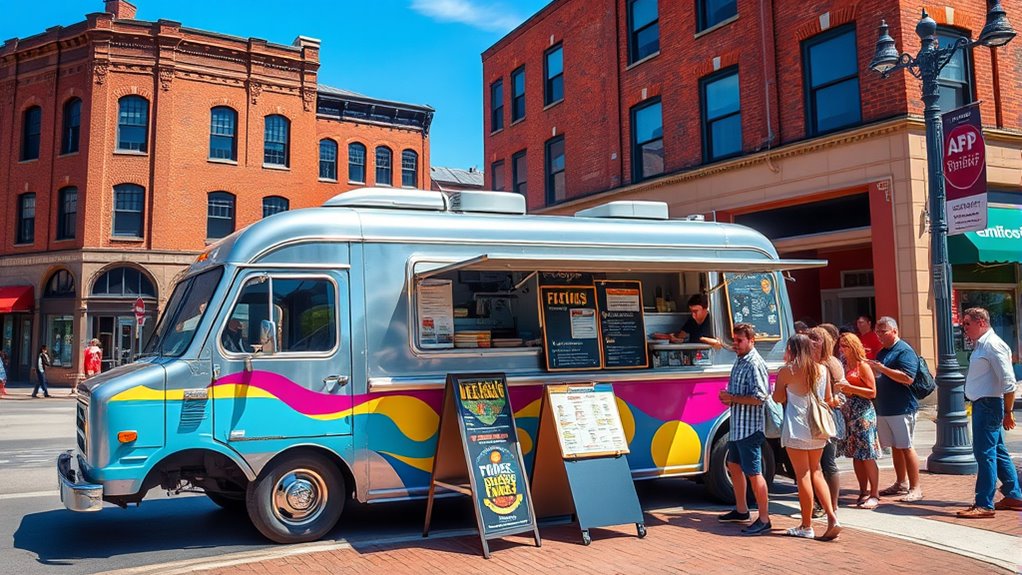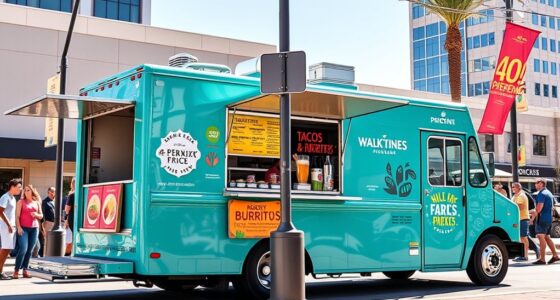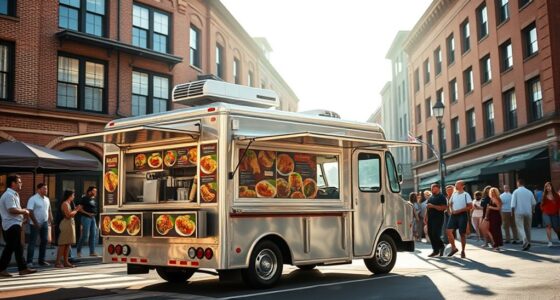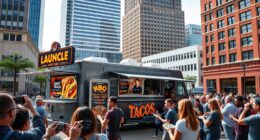To open a food truck in Springfield, Missouri, you’ll need to secure permits like the Mobile Food Establishment Permit and meet safety, zoning, and health code requirements. Expect costs from $103 to $163 annually, plus extra for special events. Choose compliant locations with proper permits and utilities, develop a menu that attracts customers, and plan effective marketing strategies, including social media and community involvement. Continuing guarantees you’ll get detailed steps to launch your food truck successfully.
Key Takeaways
- Obtain necessary permits including Mobile Food Establishment and Food Service permits, ensuring compliance with Missouri Food Code.
- Budget for permit fees ($103-$163/year), insurance, equipment, and operational costs to maintain financial health.
- Select compliant locations within permitted zones, ensuring access to utilities, water, waste disposal, and adherence to zoning regulations.
- Equip and maintain your truck properly, managing inventory, safety standards, and vehicle inspections for daily operations.
- Develop marketing strategies utilizing social media, community involvement, branding, and local SEO to attract and retain customers.
Navigating Permit and Licensing Requirements
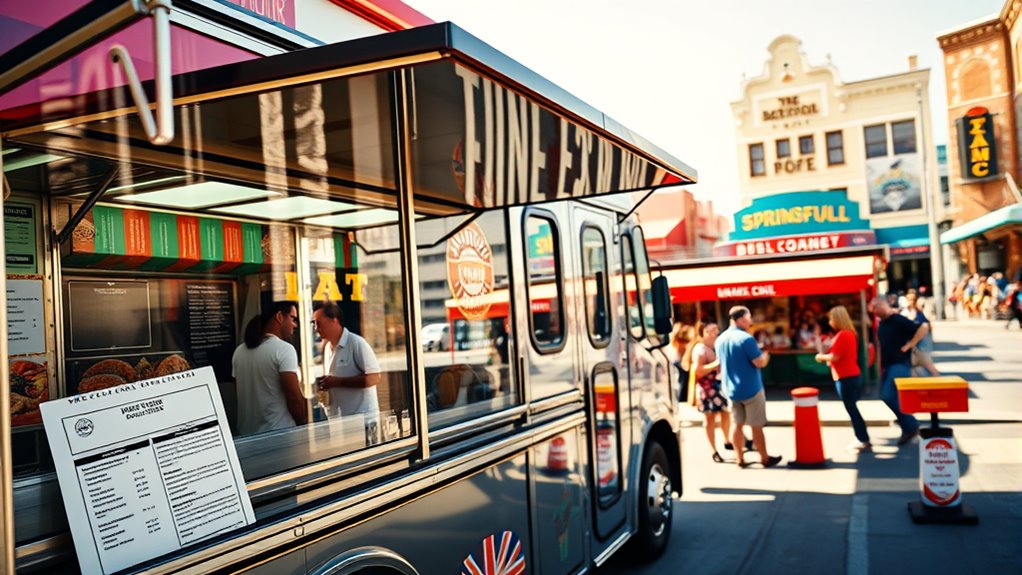
To operate a food truck in Springfield, Missouri, you need to navigate a series of permit and licensing requirements that guarantee compliance with local health and safety regulations. First, you must obtain a Mobile Food Establishment Permit before any food preparation or service begins. This involves submitting a Food Establishment Permit Application and a Mobile Food Establishment Addendum, which determines inspection frequency. You’ll also need a general business license and a Mobile Vendor Permit, typically obtained through the city’s street department. Proof of vehicle and liability insurance, along with fire safety certification, is essential. During the application process, health inspectors evaluate your truck’s equipment, menu, water sources, and waste disposal plans. Once approved, you’ll need to renew permits regularly and make certain your operation aligns with Missouri Food Code and local ordinances. Additionally, you must ensure all documentation, including driver’s licenses and health permits, are current and maintained for ongoing compliance.
Understanding Costs and Fee Structures
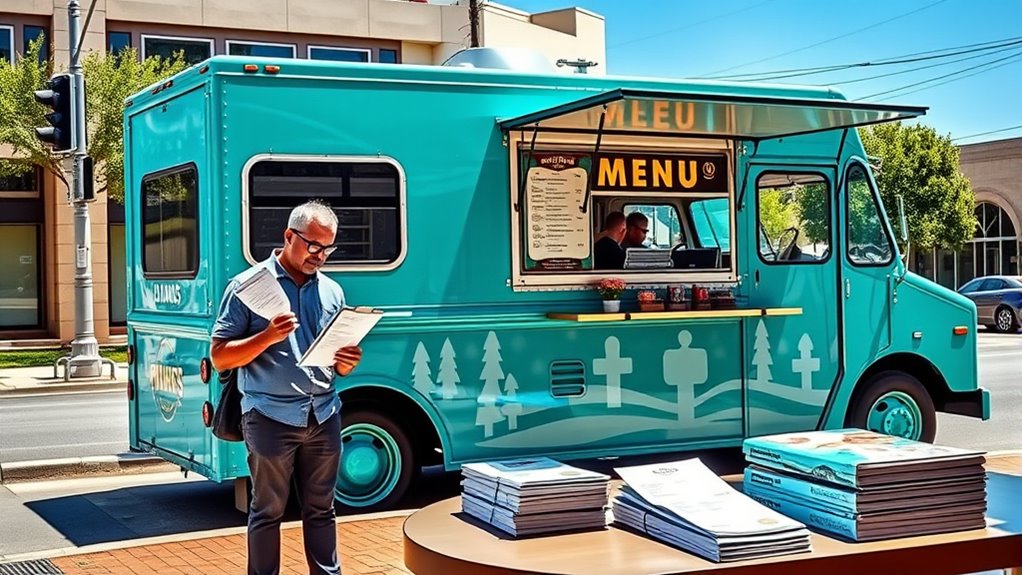
Understanding the costs involved in operating a food truck is essential for planning your budget. Permitting expenses, including Springfield’s mobile food establishment fees, can range from $103 to $163 annually, with additional charges for special events. Keep in mind that other fees like insurance, maintenance, and marketing also add to your overall costs, so it’s important to factor them all in. Additionally, staying informed about regulatory oversight can help ensure compliance and avoid unexpected penalties.
Permitting Expenses Breakdown
Handling the permitting expenses for a food truck in Springfield, MO involves understanding various fee categories and additional costs that can impact your budget. The High Priority Mobile Food Establishment Permit costs $163 annually, while the Low Priority permit is $103. These fees apply to trucks, trailers, and pushcarts selling potentially hazardous foods. Keep in mind, cottage law foods prepared at home don’t require permits. You must apply at least 10 days before opening, and fees are payable online, in person, or by mail. Additional costs include permits for specific markets or events, ranging from free to $250 per festival. Licensing fees for hawkers and vendors vary from $5 monthly to $25 yearly. Budget accordingly, as permit costs differ based on food risk level and operation type. Understanding market trends can help you select the most lucrative locations and menu options to maximize your success.
Additional Fee Considerations
Beyond the initial permitting fees, food truck operators in Springfield must consider various additional costs that can substantially impact their budget. Insurance costs vary depending on coverage, vehicle size, and employee needs, with premiums potentially reaching several thousand dollars annually. Maintenance expenses, including routine repairs, waste disposal, and fuel, also add up over time. Event-related fees, such as festival charges and parking permits, can increase costs, especially during busy seasons. Marketing investments, like branding, social media ads, and promotional materials, are essential for visibility and can range from hundreds to thousands of dollars. Keep in mind, additional compliance costs, like health inspections or staff certifications, can further affect your overall expenses. Additionally, understanding fee structures is crucial for accurate budgeting and avoiding unexpected charges.
Choosing the Ideal Location and Zoning Compliance
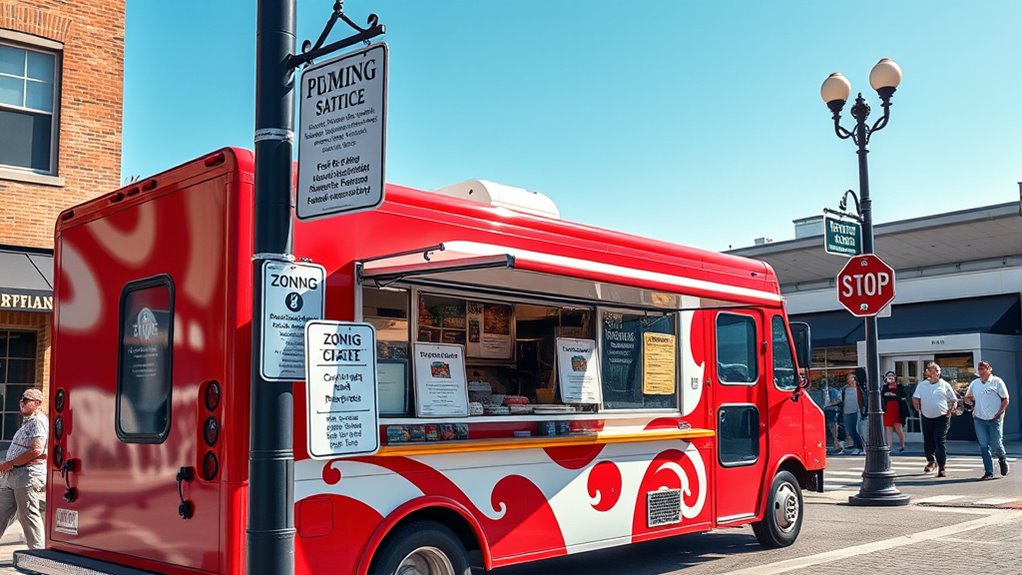
Choosing the right location is key to your food truck’s success, but you need to follow Springfield’s zoning laws. Make sure your spot is in a permitted commercial zone and stays at least 100 feet away from residential areas. Always verify property owner approval and check for any special zoning requirements to keep your operation compliant. Additionally, understanding local regulations can help you identify hidden opportunities and avoid potential legal issues.
Zoning Regulations Overview
Selecting the right location for your food truck in Springfield requires understanding the city’s zoning regulations to guarantee compliance and smooth operations. First, ensure your chosen site is within approved commercial zones, like C-2 districts, which allow food trucks. Second, avoid operating within 200 feet of residential districts or 100 feet from dwellings in sensitive areas to minimize disturbances. Third, verify that servicing areas—such as kitchens or storage—meet zoning laws, including water, plumbing, and waste disposal standards. Additionally, confirm that parking permits are secured for your designated spot and that operating hours align with zoning restrictions. Consulting Springfield’s City Planning and Development departments is essential before finalizing your location to make certain full compliance with zoning codes and buffer requirements, preventing costly violations. It’s also advisable to review existing zoning maps and ordinances to identify any restrictions specific to your intended area. Ensuring your zoning compliance minimizes legal issues and promotes a positive reputation within the community.
Location Accessibility Requirements
Ensuring your food truck operates smoothly requires careful attention to location accessibility and zoning compliance. You must choose a servicing area that’s an actual building, not another food truck or temporary structure. If outside Springfield, restroom access must be within 500 feet on the same side of the road. Your location needs to meet zoning laws and provide essential services like water, trash disposal, and storage. Parking must be safe, accessible, and approved by property owners if on private land. Proximity to public roads is crucial for easy entry and exit. Restrooms must be available for employees and customers, complying with health codes. High foot traffic, ADA accessibility, and nearby utilities also influence your spot’s suitability, ensuring smooth operations and compliance. Additionally, local zoning ordinances can impact your choice of location and may require permits or adherence to specific land use restrictions. It’s important to consider the permitting process early to avoid potential legal issues that could delay your launch.
Developing a Food Menu and Ensuring Safety Standards
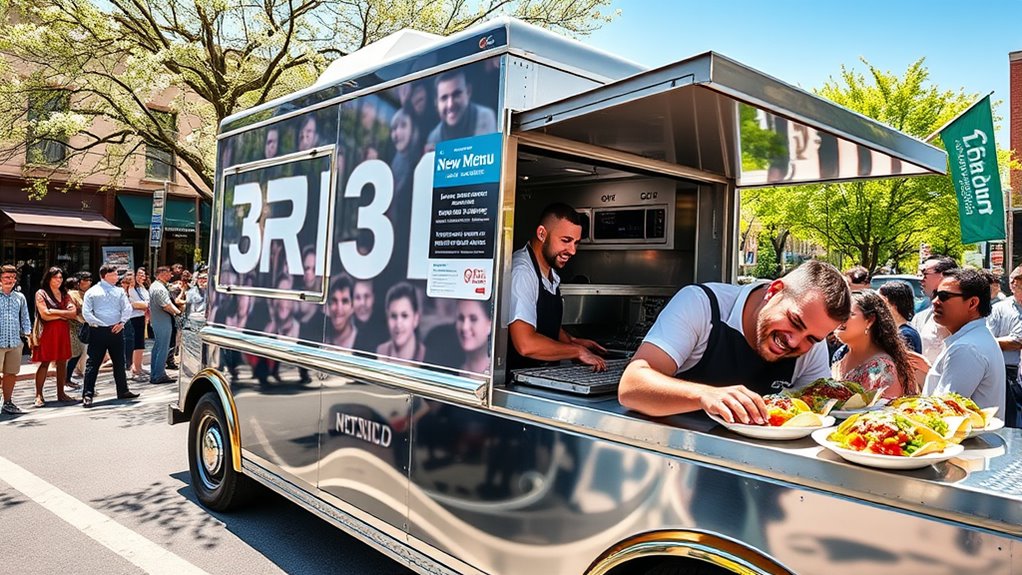
Developing a food menu for your Springfield food truck involves balancing variety with operational efficiency to keep service fast and consistent. You want to include local favorites and seasonal ingredients to appeal to customers. Focus on:
- Keeping menu items simple with manageable ingredients that require minimal prep and storage.
- Designing dishes that maintain quality and safety during mobile service, following Missouri Food Code standards.
- Offering allergen information and dietary options like gluten-free or vegan choices to attract a broader customer base.
To guarantee safety, follow Missouri Food Code regulations, implement procedures for temperature control, proper storage, and employee health. Ensuring compliance with local health inspections is crucial for legal operation. Maintain detailed safety documentation, label ingredients correctly, and prepare for inspections to keep your truck compliant and your customers safe.
Managing Operations and Facility Needs
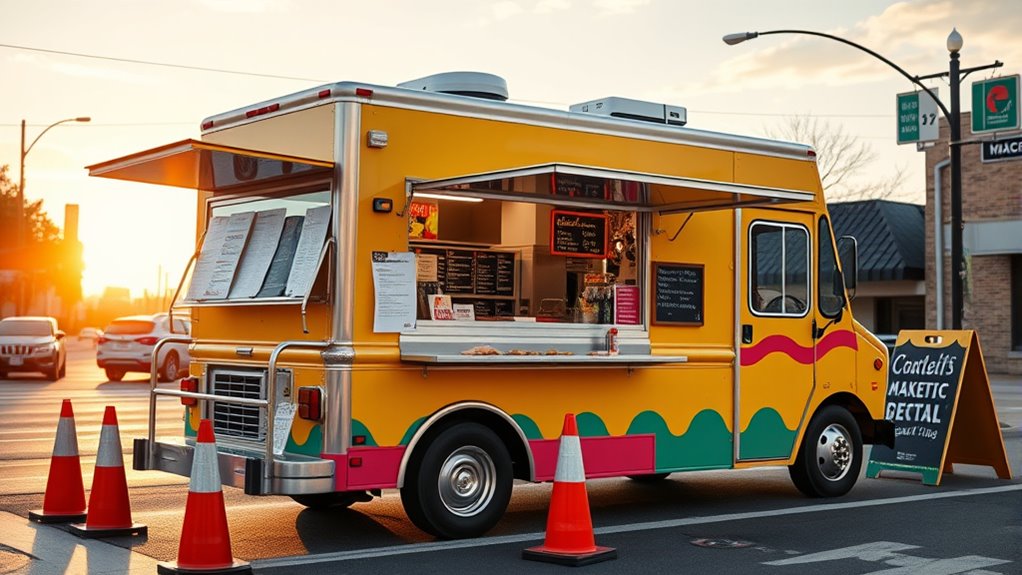
Managing operations and facility needs for your Springfield food truck requires careful coordination of daily activities, from food prep and service to customer interactions. You need to oversee food preparation, guarantee service stays efficient, and maintain a positive customer experience. Staff scheduling is vital to cover peak and off-peak hours, while inventory management keeps track of perishables and non-perishables to prevent shortages. Regular equipment maintenance avoids breakdowns and ensures health code compliance. Your truck must meet Springfield-Greene County health regulations, including proper water supply, waste disposal, and power connections. Storage when not operating is essential to protect your equipment. Additionally, guarantee your vehicle is registered, insured, and complies with all local permits and inspection requirements to keep your operations running smoothly. Implementing safety protocols is also crucial to protect staff and customers from potential hazards. Incorporating space and organization strategies like proper storage solutions can further streamline your daily operations and ensure compliance with health and safety standards.
Crafting a Marketing Strategy to Attract Customers
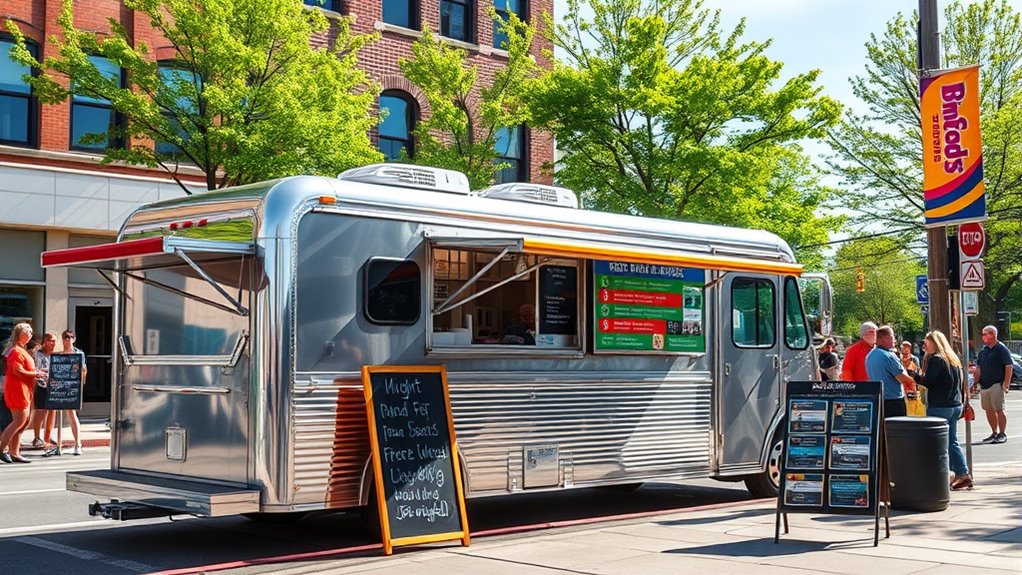
Creating an effective marketing strategy for your Springfield food truck begins with understanding how to attract and retain customers through a mix of innovative offers and strong visual branding. First, utilize limited-time offers and seasonal specials to generate buzz and encourage repeat visits. For example, holiday-themed items or local ingredients make your menu relevant and fresh. Second, develop bold, vibrant truck wraps and clear signage with QR codes to catch attention and facilitate easy ordering. Third, leverage digital marketing by optimizing your website with local SEO, engaging on social media, and partnering with influencers to expand reach. Additionally, supporting online reviews and active community participation can significantly enhance your reputation and visibility. Incorporating stress-relief techniques like mindfulness practices can also improve your overall business approach, helping you stay focused and motivated. These strategies, combined with community involvement and strategic location choices, help build a loyal customer base and boost your food truck’s visibility in Springfield’s competitive scene.
Frequently Asked Questions
What Are the Specific Health Inspection Criteria for Mobile Food Trucks?
You need to guarantee your mobile food truck passes health inspections by maintaining cleanliness, preventing cross-contamination, and using safe, uncontaminated ingredients. Your equipment and utensils should be sanitized regularly, and food must be stored properly. You’ll need to post inspection reports visibly, and your food handling practices should follow local health department standards. Meeting fire safety and obtaining necessary permits are also essential for passing inspection and operating legally.
How Long Does the Permit Approval Process Typically Take?
Permit process pace proves predictable, typically taking about two to four weeks. You start by submitting your application, which the city reviews within 10 days. Next, you pay the fee and schedule your pre-opening inspection, usually on a Thursday morning. Once everything checks out, the permit is issued, valid until December 31. Staying prompt with payments and scheduling keeps your permit on track, minimizing delays and ensuring a smooth start.
Can I Operate My Food Truck at Multiple Locations Daily?
You can operate your food truck at multiple locations daily, but you need the right permits and proper planning. Springfield-Greene County requires a Mobile Food Establishment Permit for moving between sites. You’ll also need to coordinate parking, water, power, waste disposal, and adhere to health regulations at each spot. Proper scheduling, local permits, and compliance guarantee smooth operations and prevent fines or shutdowns.
Are There Restrictions on Serving Alcoholic Beverages From a Food Truck?
You can serve alcohol from your food truck, but you must follow specific restrictions. You need a primary retail license, and your mobile unit must establish a defined “premise” to sell intoxicating liquor. Serving alcohol at events requires a temporary catering permit, and your locations must adhere to zoning laws. Additionally, you must coordinate with city departments, pass inspections, and guarantee all permits are current for legal, responsible alcohol service.
What Are the Insurance Requirements for Operating a Food Truck in Springfield?
Wondering what insurance you need? You must have commercial auto insurance covering accidents, property damage, and liability, with minimum limits of $25,000 per person and $50,000 per accident. Additionally, you need general liability, property, and workers’ compensation if you employ staff. These policies protect against food contamination, fire hazards, and injuries, ensuring you’re compliant with Springfield’s regulations and ready to operate smoothly on the road.
Conclusion
Starting your food truck in Springfield, Missouri, means maneuvering permits, understanding costs, choosing locations, developing menus, and crafting marketing strategies. It’s about planning wisely, executing confidently, and growing steadily. By balancing permits with passion, costs with creativity, locations with customer needs, menus with safety, and marketing with authenticity, you set yourself up for success. Embrace the journey, learn from each experience, and watch your food truck thrive in Springfield’s vibrant community.
